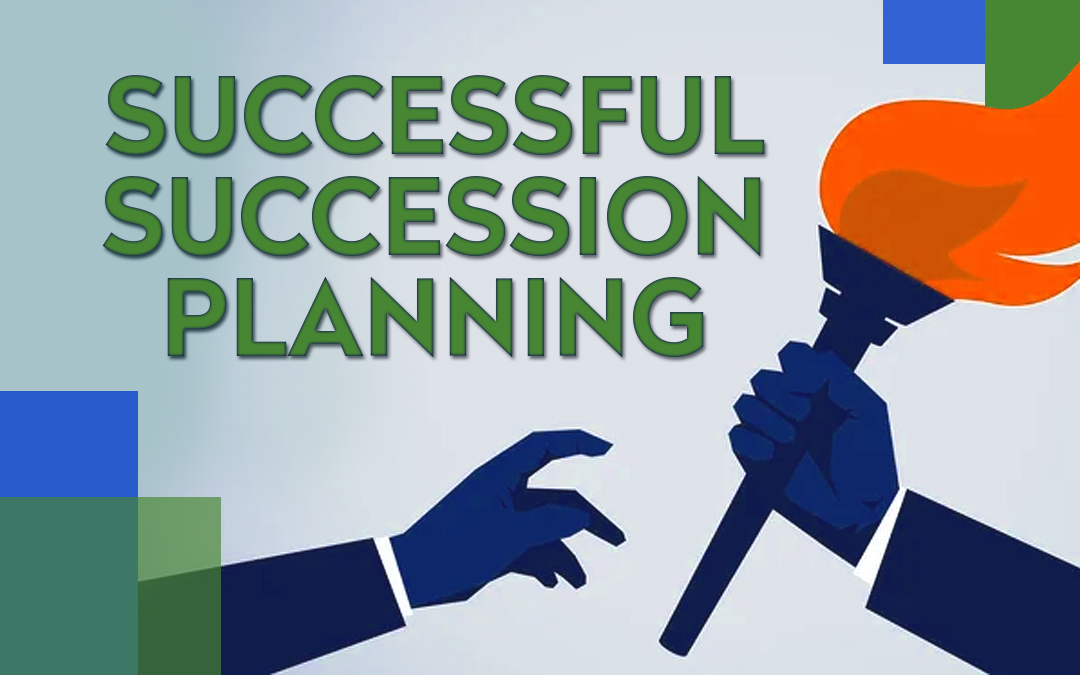Succession Planning, if not done with thoughtful planning, handing down the family business can be a complicated, emotional process. You’ve poured your ideas, knowledge, money, time, and passion into your business. You may have raised a family as you rode the company’s waves of successes, failures, and challenges. You likely created a ton of memories and feel a great sense of pride that comes with being a business owner.
But someday, you may want to retire.
With that in mind, you’ll need to do some thorough succession planning, which requires open and honest conversations with your children and other close stakeholders about who you feel is your company’s next best bet.
Here are some suggestions to guide you, with a bit of my own experience thrown in.
Plan Early for Succession
As in all things, planning early is crucial. Succession is no different. The passing of the family business torch should be a slow process. Research shows that 25% of failed transition attempts happen because a successor hasn’t been properly prepared. This happens for many reasons. It could be that the founder doesn’t have faith in the next generation or does not support the direction the assumed successor is considering. The assumed successor may not feel up to the task or may not want the family business as his/her future but feels pressured to take it on.
According to the Family Business Consulting Group, if you want to keep the business in the family, start conversations about it when your children are young. Entrepreneurs should be mindful to talk positively about the business as opposed to complaining about day-to-day difficulties. While your home is the place to destress and unwind, be sure to highlight the joy of being an entrepreneur so that children gain an appreciation for the business.
When I think back to my childhood, I remember my dad heading off to work every day. He was helping people, especially small business owners, meet their financial goals and realize their dreams. It made a positive impression on me.
Have “The Talk” about Succession
Mixing family and business can be tricky. Start with casual conversations to get the ball rolling. These talks can help you discover where your child is and where they want to be in five to 10 years. Allow them to give their opinions or express concerns free of judgment or pressure. This approach builds trust and sets a safe stage for future conversations.
Some questions/topics to consider for early discussions:
- What are your feelings about the family business?
- What are your dreams for the future?
- Can your areas of interest be incorporated into the family business?
- Explain the type of education or training they would need to begin working in the business
I was planning to have a career in social work when I realized I could change people’s lives in another way. I started taking accounting classes in September 2001 and began working for my dad that same week. I chose accounting as my direction and positioned myself to gain knowledge from my dad daily.
Succession-in-the-works
If you’re beyond those early talks and succession is a certainty, you may want to bring up these questions/topics to start developing your plan:
- How long should a successor work in the business before the transition begins?
- Have they completed all the training and education that is necessary to run the business?
- Should they work outside of the business for a time to gain experience?
- When would the transition begin?
- Income/benefits/vacation
- How long will the founder have decision-making control? Partial control? Officially retire?
I sat for and passed the CPA exam in 2013, obtained my license shortly thereafter, and became a Montecino & Ciaccia CPA shareholder in January 2014. For me and my dad, the transition seemed organic. It was natural to assume I would buy my dad out at some point.
In 2018, we began seriously talking and planning for succession. We did everything that year with the intention of my dad’s retirement and my ascension as sole shareholder. One very clear moment happened in December 2019 when my dad and I set the final transition date – June 30, 2021.
Believe me, there were days when I had my doubts about taking this path. It was really scary to think about being the sole shareholder/owner and making all the decisions, responsible for an entire team of people, their families, and my own family. But I’d been heading in that direction for ten years, so I worked through those doubts and I’m so happy I did.
Writing the Succession Plan
Having a documented succession plan is deemed a good practice. With the stressful details talked out in advance, agreed upon, and written down, we had little cause for arguments throughout the process. Referred to as a great “peacekeeping tool,” Forbes, states that written succession plans can also allow owners to determine options for non-family employees who’ve significantly contributed to the company’s success.
Potential Successors Outside of the Family
If you don’t have children or your children have no interest in taking on the family business, there are alternatives. You can look within your organization for a leader who’s demonstrated strong business acumen, alignment with your company culture, exceptional work ethic, and keen management skills.
Other succession options exist that would benefit the business owner and the company’s employees. According to the Daily Herald, “One growing option for an exit is to sell the business to its employees, often gradually through an Employee Stock Ownership Plan, or an ESOP.” An ESOP is more complicated to set up and manage, so be sure to review other opportunities. Two mentioned in this article and recommended for smaller businesses are worker cooperatives (a cooperative owned and self-managed by its workers) or equity compensation arrangements (an employee perk that gives employees an ownership stake in the company once they meet internal vesting requirements).
Happy Successor | Happy Retiree
It’s really hard working for and with family. For my dad and I, at the end of the day, we were still family and that focus remained most important. I remember one day, probably eight years ago, my mom was away for the week and my husband was working. My dad and I made plans for him to meet me and my kids for dinner. I walked out the door at the end of the workday and commented that it’s great that we spend every weekday together and still want to be together after the workday is over.
We’re celebrating year two as Ciaccia CPA this month! I’m proud of the work we do and happy to have a wonderful team by my side. My dad is enjoying his retirement, so much so, that my parents have become snowbirds, spending some time in Florida golfing and visiting Disney like a couple of kids.
My dad taught me to believe in myself. He showed me that I can’t expect anyone to believe in me if I don’t believe in myself. I hear his words of advice every day. He started this company and we grew it together; he gave me a great foundation and I’m building on it. I call that succession success!


